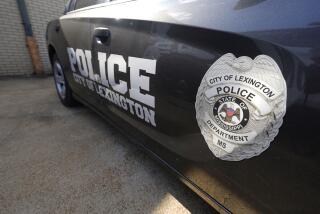Push Against Bias in Traffic Stops Arrested
- Share via
WASHINGTON — A veteran lawmaker calls the infraction DWB: driving while black. And this year, most members of the House sent a clear signal of concern about discriminatory traffic stops by police.
But the bill that sailed through the lower chamber has run into trouble in the Senate. Because of the protests of police organizations, the bid to get the Justice Department to collect racial and ethnic statistics on traffic stops appears buried.
Rep. John Conyers Jr. (D-Mich.), a leading member of the Congressional Black Caucus who had shepherded the measure through the House, acknowledged he was surprised by its passage. Approval came after Republicans amended it to make clear that data acquired in the study could not be used to establish “an inference of discrimination” in future lawsuits arising from contested stops of black motorists by police.
Now Conyers’ proposal appears consigned to the graveyard of the Senate Judiciary Committee. “Frankly, I’m dismayed that the Senate cannot take even such a small, simple step to address this significant problem,” Conyers said recently.
Leading the effort to derail the bill has been the National Assn. of Police Organizations, representing 4,000 unions. Other law enforcement groups have joined in the attack, including the National Troopers Coalition.
Robert T. Scully, executive director of the police association, conceded that the House’s passage of the measure, which had no hearings, caught him and others by surprise. “We didn’t think anything would ever come of it because Conyers, frankly, has a reputation for introducing bills that never go anyplace.”
In mobilizing against the bill, the law enforcement groups have told senators that police would resent being asked to collect data on the race or ethnic background of those they stop and often search, and that many motorists probably would balk as well.
But their main argument, as stated in a letter from Scully’s group, is that there is “no pressing need or justification for this study.”
Others could not disagree more.
During House debate, Conyers said: “There are virtually no African American males--including congressmen, actors, athletes and office workers--who have not been stopped at one time or another for an alleged traffic violation, namely driving while black.”
*
In an opinion two years ago, Judge Stephen Reinhardt of the U.S. 9th Circuit Court of Appeals wrote: “It is clear . . . that African Americans are stopped by the police in disproportionate numbers.” The ruling upheld a $20,000 judgment against Santa Monica police for violating the constitutional rights of two black New Yorkers. Their car was stopped and they were searched at gunpoint when they returned to their hotel because police thought they bore a vague likeness to two suspects in a series of Southern California robberies.
Both men were handcuffed. The court, concluding their resemblance to any suspects was greatly exaggerated, said the two innocent tourists had been detained without probable cause.
In Los Angeles, a highly publicized stop occurred in 1984 when a Hollywood Division officer pulled over professional football player Marcus Allen, who was driving a new Ferrari. The officer later said he thought the car was stolen.
Allen, who had a gun pointed in his face, said the incident was defused only when children at a nearby school shouted, “Hey, it’s Marcus Allen!”
“I wasn’t afraid; I was just so mad,” Allen told reporters.
Justice Department officials say they support Conyers’ proposal because it “could provide valuable information to help the department analyze whether routine traffic stops . . . result from discrimination based on race or ethnicity in violation of federal law.”
The bill’s proponents hope that, at the least, it would discourage officers from using race as a primary factor in determining whether to search certain vehicles, often on the claim that a motorist fits the “profile” of a drug offender.
Figures compiled by Maryland State Police show that 73% of all cars stopped and searched along the Delaware-Baltimore corridor since January 1995 were driven by blacks. Nothing was found in 70% of the searches.
More to Read
Get the L.A. Times Politics newsletter
Deeply reported insights into legislation, politics and policy from Sacramento, Washington and beyond. In your inbox twice per week.
You may occasionally receive promotional content from the Los Angeles Times.









